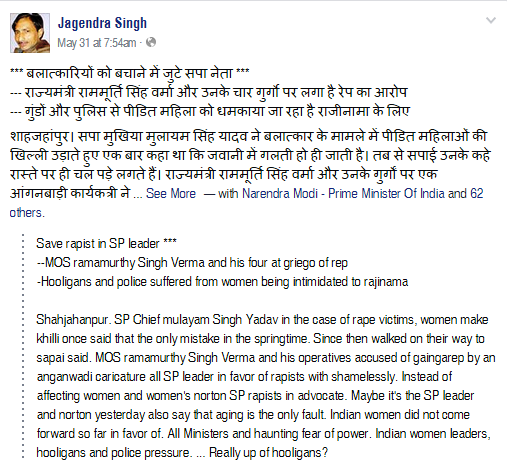
Indian journalist burnt alive: The price of doing your job right
The journalist alleged that the minister was involved in the gang-rape of a local woman and hence paid the price.
Life – that’s the price one may have to pay for doing one’s job the way it is supposed to be done.
On May 5th, a female aganwadi (children’s play group) worker was gang raped in India’s Uttar Pradesh. The woman had pleaded with the court to register an FIR against the accused minister, Ram Murti Verma. That is when a Shahjahanpur-based journalist, Jagendra Singh, decided to highlight the gory incident and did whatever he could to get the story of the rape victim across.
India is ranked 13th on the Committee to Protect Journalist’s (CPJ) Annual Impunity Index, which spotlights countries where journalists are murdered and their killers go free. India has repeatedly failed to advance justice in the cases of journalists working for local print publications that have been slain in connection to their reporting on corruption, politics, or crime, the CPJ research shows.
Realising the power of social media, he used Facebook to constantly create room for justice to be provided to the poor woman and to punish the criminals, which included the minister. Singh proved to be successful in doing so, but in the process, he paid the heaviest price possible. It cost him his life.
On June 1st, a group of police officers and goons burnt him alive.
An FIR has now been registered against the minister and four others with charges of murder, intent to provoke breach of peace, criminal intimidation, and criminal conspiracy.
Singh has been a loud critic of politics and current affairs in Hindi language newspapers and on his two Facebook public pages, which have more than 4,000 followers combined. English and Hindi-language news reports did not specify what newspapers he had written for. His son said that Singh posted news stories on Facebook based on information he obtained through India’s Right to Information law and other sources, according to The Indian Express.
Singh was openly critical about Verma, alleging that he was involved in illegal mining and land grabs, the reports said. In a May 31st Facebook post, along with an accompanying photo of Verma, the journalist alleged that the minister was involved in the gang-rape of a local woman. In another post, a day earlier, Singh questioned the land holdings amassed by the minister.
 Photo: Facebook page
Photo: Facebook pageIn a Facebook post on May 22nd, Singh wrote,
“Ram Murti Singh Verma can have me killed. At this time, politician, thugs, and police, all are after me. Writing the truth is bearing heavily on my life. After exposing some of Ram Murti Verma’s acts, he had me attacked...”
 Photo: Facebook page
Photo: Facebook pageSingh shouldn’t have needed to give up his life before the world could see the real faces of the minister and police officers, but it’s a grim reality in this part of the world.
Singh’s murder highlights the problems with the sluggish justice system and also sheds light on how dangerous it has become for journalists to bring forward problems and wrongdoings, when instead it should be easy and convenient in the presence of all the technology that is available to newsmen today.
The tragedy is not only that of the Indian journalist. Without going into much detail, I can tell you that many journalists in Pakistan have had to pay the same heavy price for not giving up on what their profession demands of them; speaking the truth.
I have attended seminars and even hosted discussions on how to deal with this problem. A lot is often said about the responsibility that lies with journalists’ organisations, regulatory bodies, and even governments for ensuring a safe working environment, but I’m afraid unless enough courage is mustered up to face the truth, the truth will continue to be suppressed in this cowardly way.
Journalists too, should always keep in mind the adage; no story is worth your life.
But do we take notice, or have we started blaming the journalist for crossing the red line out of helplessness?
It’s good to see though how Amnesty International India is speaking up about the incident and demanding the Utter Pradesh government to set up a thorough, independent, and impartial investigation into the alleged extrajudicial execution of a journalist by the state police. Again, I am neither hopeful nor sure if an investigation of this kind demanded by Amnesty International will materialise.
The unfair killing of Jagendra Singh once again goes to highlight the perilous professional path that journalists tread on. It is important to punish criminals, for if we fail to do so, we will be sending out a message to the barbarians that they are free to operate with impunity and free to continue to silence voices they cannot bear to hear.
What happened to Singh is heart-breaking, but incidents such as these have never succeeded in discouraging journalists from doing their job. Wherever they might be, they continue to bring forward the injustices prevalent in the world today, and they do that with a great sense of pride.
Professionals such as Jagendra Singh are the hope that we all need.




COMMENTS (34)
Comments are moderated and generally will be posted if they are on-topic and not abusive.
For more information, please see our Comments FAQ